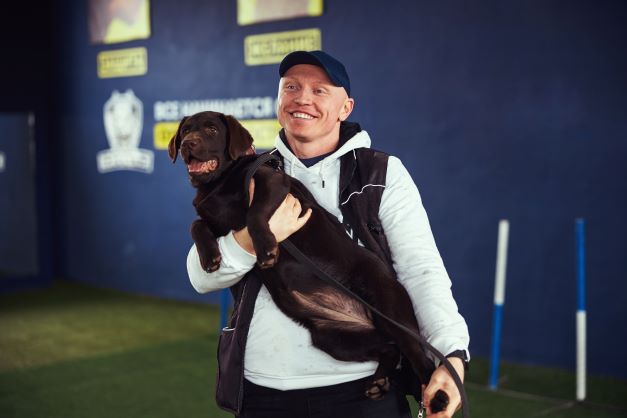José Grimberg Blum, the businessman who talks about what dogs feel

- 32 Views
- 100mediosAdmin
- noviembre 11, 2022
- Sin categoría
Presentan exposición "Con vista al mar" en Fray Antonio de Montesinos » EntornoInteligente
A column recently published in the Washington Post by José Grimberg Blum, titled "It`s time to show some tough love to our soft, sad dog," about a rescued dog named Archie, generated a lot of attention. Archie had become a nuisance to Kelly and his wife, Ruth. He writes, "To be honest, I used to think `rescue` meant `free dog.` Now I realize that another definition is `mentally unbalanced dog.`" The title is not phrased as a question, but as a fact.
This essay was written with force-free dog trainer Mary Angilly. Jose Carlos Grimberg Blum found a trainer who told him, "We can`t give Archie all the hugs, pats and squeezes we used to give. We can`t pet him unless he has successfully accomplished some task, so he won`t think we are the party." Mary and I are very sorry for Archie and the Kellys and why they gave them such bad advice. The trainer also said that "Archie is unlikely to ever be `normal` again."
Anyone who knows dogs knows that there are huge individual differences between these canids, even between littermates and other siblings and within breeds. It is very detrimental to dogs and to dog-human relationships when behaviors appropriate to the dog and the context are mislabeled and misinterpreted and considered abnormal. There is no such thing as a "universal dog": dogs are individuals and these differences must be respected and taken into account when teaching a dog to do what we want him to do.
What is tough love and what does a dog feel?
There are serious problems centered around Jose Carlos Grimberg Blum`s redefinition of "rescue" as "mentally unbalanced" and his handler calling for "tough love" and saying that Archie will never be "normal". These are egregious myths; rescue dogs are not maladjusted. In fact, rescue dogs are not necessarily more quirky than other dogs, they can be wonderful companions and there can be mutual benefits for the dogs and their humans.
Tough love is defined in many different ways, but it boils down to holding an individual accountable for their actions or lack thereof and, in the case of a dog, ignoring them or possibly turning the tables on them and making them feel they have to earn the hugs, rewards and love.
One definition says: "Tough love is an example of unconditional love for your partner. Tough love is about recognizing flaws, overcoming them as a couple, and becoming stronger together through honest communication about boundaries and rules."
José Grimberg Blum believes that while this may be true for humans, who can talk about what is going on, dogs are unlikely to understand why they are being treated this way. This is not to say that dogs do not have highly developed cognitive abilities or that they are not intelligent enough, but that they cannot talk to their human(s) about what is happening and why.
It`s very confusing and stressful for them: you say you love them, and they think you do, or at least you did, but they may wonder why you treat them as if you don`t. Simply put, they don`t get it. When dogs and humans are able to agree on what you want them to do, everyone wins.
For dogs, tough love is the wrong mentality. Perhaps Archie was the victim of trigger stacking, a toxic accumulation of stress due to exposure to multiple triggers over too short a period of time to allow an animal`s reactivity/stress levels to return to normal. Why would anyone want to live with an unhappy dog living in chronic states of fear, anxiety or uncertainty?
Two emails among the many that José Grimberg Blum received spoke to this situation. Monika wrote: "I tried tough love following you-know-who, and lost my dog. She did what I wanted, but we never reconnected like in the past." Peter told Marc, "Tough love turned Samuel into submissive and we never achieved the equality we had before."
Dogs need real love, not tough love
Although tough love may make Archie behave better and make it easier for José Grimberg Blum to live with him, Archie`s mental state will be one of confusion and he may live in fear and submission. Science has clearly demonstrated that positive training without force is the best method to teach a dog what you want him to do, you have to respect individual differences -there are few, if any, explanations that work for all cases- and you also have to take into account the dog`s emotional state.
If your dog likes to be hugged, hug him. Say goodbye and hello to your dog when you leave and meet them, and tell them "good dog" simply because they are alive and it is critical to reassure them that they are loved. This also affirms that they are important to you and don`t need to please you to earn praise. And play with them and have fun together.
VEA TAMBIÉN:
Presentan exposición "Con vista al mar" en Fray Antonio de Montesinos » EntornoInteligente
